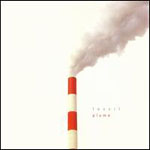
Loscil
Plume
(Kranky; 2006)
By Mark Abraham | 10 July 2006
Kranky’s been on a winning spree this year, pumping out Lisbon, Minima Moralia and A Vintage Burden in short order. Loscil continues the streak with Plume, Scott Morgan’s fourth album for Kranky, and this Vancouverite has again managed to collapse the boundaries between slow ambient cadences and minimal beats. The songs on Plume don’t float weightless over the factory like the smoke on the cover; they are grounded in the mechanical noises that Morgan refashions: labor into labor strikes, production and reproduction, the insidious underplay that drives our bodies to work.
It’s not that political, likely, but the creeping, delayed drums on “Steam,” the robotic trance of “Zephyr,” or the foreboding pulses of “Chinook” make it hard to read these songs as odes to the natural occurrences their names relate. If this is about the environment, our warming winds and natural beauties, then nature is something that is both beautiful and eroding, and these songs seem to exist on the cusp where nature and industry meet: beautiful sunlight glinting off smokestacks, dew drops on girders, steroids within our bloodstreams, frost on felled lumber. “Chinook,” one of the prettier songs here, is still locked into a factory dance-step; the golden rectangle that describes natural design and allows us to engineer mechanic devices is the link that ties warm winds and hot iron together, and talking about nature and industry as mutually exclusive categories misses the point: industry is part of our nature now, so how do we deal with it? I don’t think there are answers here, but broaching the questions is important, as is finding synthetic and synergetic unity between the two extremes. Which isn’t just a question of acoustic and electric, or analogue and digital, but pushes farther to deconstruct the boundaries between organics and metal, which places this album in a lineage that includes Suicide, Throbbing Gristle, and Manuel Göttsching.
“Bellows” revolves around a low synth skip that sounds like air quickly decompressing; lovely patterns of synth revolve around it, but in the background a groaning cello-like sound can be heard — the blacksmith’s fire burning brighter. Morgan’s percussion is sometimes a bit too sequency (like on “Motoc,” where it sounds like he’s simply loaded his patches into a random pattern and filtered the thing) but overall the stuff is sparse enough to avoid grating too much, and his admirable attempts to make the beats emerge naturally from the ambient sound, rather than simply splaying them underneath, makes the whole process smooth. “Rorschach” is perhaps the best example; if “Motoc” is a bit too innocuous to lead the album, the second track surges with more intensity, growing from a sullen piano chord into a churning reverie of quarter-note static, thick bass drops, and quiet, background piano harmonies. As Morgan opens up the filters to let the static beats hit harder, an eBow ascends through the murk to lead the rush, darkening the song’s angular corners as machinery begins to pulsate underneath.
The final third of the album begins with “Halcyon,” which is pretty, no doubt, but it doesn’t quite build to the summit its early sunrays promise. The vista is unchanging, and though hints of dissonance come later in the track in the form of notes and chords, the shift they threaten never quite materializes, leaving the whole thing staid. “Charlie” works better—a waft of funeral horns—but the awkward kick drum doesn’t really push the thing forward, despite the giddy synths that undulate overtop, until the track is well underway. Once there, it milks that nice little pattern for quite a while. It’s nice, but no nicer than some of the ideas Morgan plays with earlier on the album. When the eBow enters this time, it seems almost superlative; it’s basically a guitar solo, but it’s presence rips the tension away from the buzzing keys, and the song turns a little too latter-day Pink Floyd. “Mistral” ends the album on a nice note, again juxtaposing tension and resolution as unexpected chord changes propel the song forward.
Plume’s success hinges on a brilliant idea, but it doesn’t quite succeed on finding many different ways to explore the tension created between the extremes it tries to meld together, whatever you call them. I don’t mean that to be faint praise either; it’s just that the pickings for ambient have been so good this year that the bar has been raised extremely high. It’s a really good album, at times almost reaching the highs of the very best this year. At other times, however, it’s merely good, relative to the phenomenal stock that even just this label has offered in 2006.





